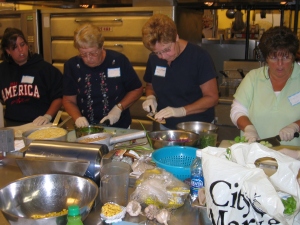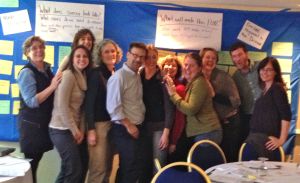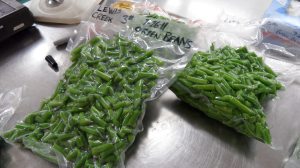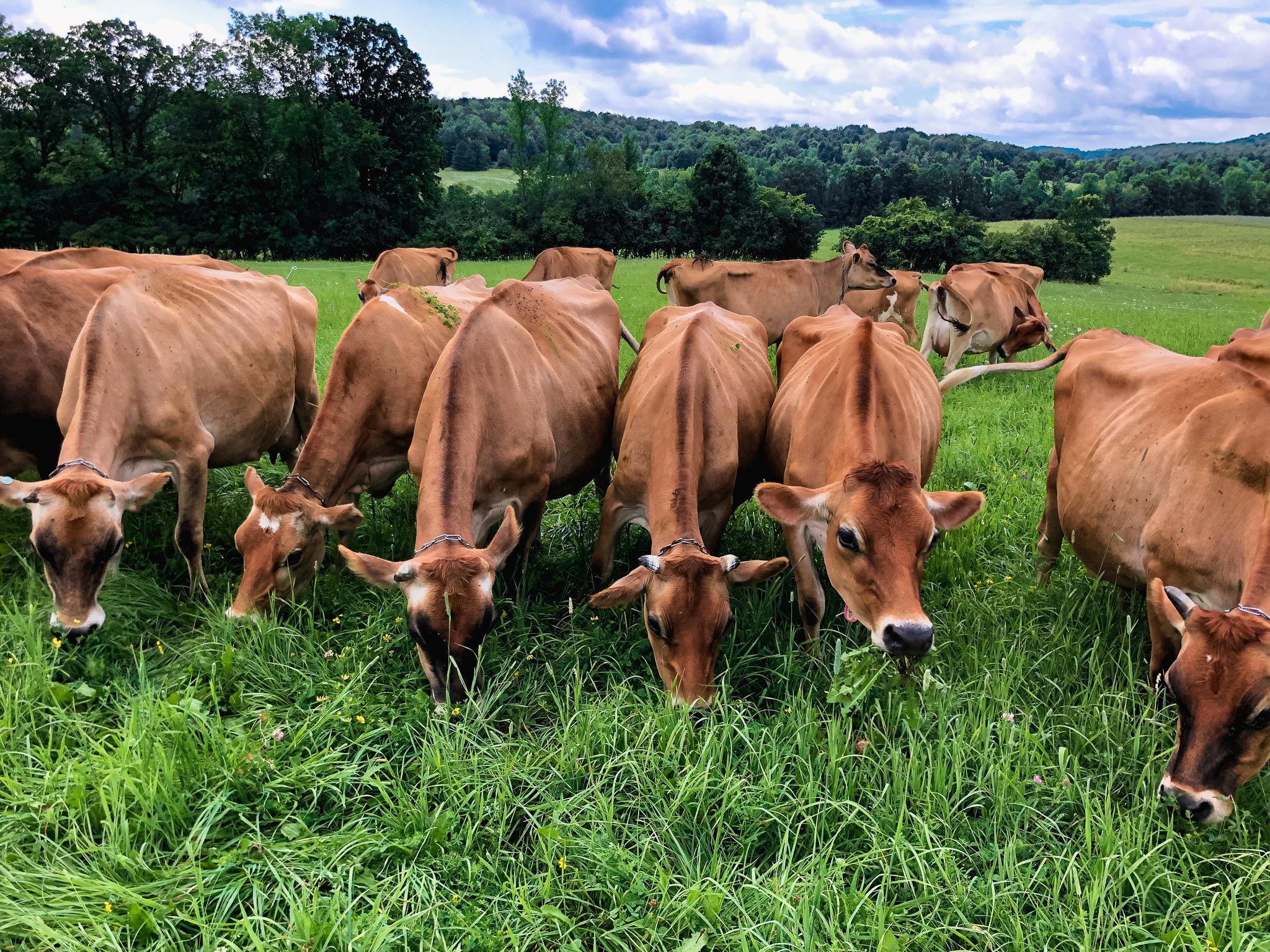
This month in Food+Co-ops, let’s look at recent developments in the Farm to Institution market channel. NOFA-VT is a leader in making sense of this market. In 2012, NOFA-VT and VT FEED released
Scaling Up Vermont’s Local Food Production, Distribution, and Marketing, a report quantifying demand by VT institutions for certain products, and inventorying statewide infrastructure. Erica Campbell, Farm to Plate Program Director at Vermont Sustainable Jobs Fund, noted that this report provides the most accurate data available on such demand. See below for how NOFA-VT’s leadership continues on the ground.
As special as Vermont is, it is part of a broader local/regional food system that provides markets for its farmers, as well as best practices. We will be looking at Farm to Institution from both a New England and Vermont perspective. Vermont and NOFA-VT are deeply involved at both scales, reflecting a path to farm viability and thriving communities.
In its latest Understanding Vermont report, entitled
Local Food for Healthy Communities, the Vermont Community Foundation looks at how institutions connect farmers and consumers for access to healthy food. One contributor to the report was Katherine Sims, Executive Director of
Green Mountain Farm-to-School, who said, “Providing good local food to all Vermonters is a unique opportunity to invest in our own health, in the health of our farms, and the health of our communities. It’s a simple vision, but a lot of innovation has to happen to achieve it—and Vermont is leading the way.”
More to the Third Power

School food staff testing local food recipes
In Vermont, there is a lot of exciting Farm to Institution work being done—from technical assistance to farmers and institutions, to relationship building and convening partners across the supply chain. The goal is to build upon and develop systems to increase the availability of local food in institutions, while simultaneously supporting and growing VT’s agricultural economy. NOFA-VT is collaborating with Rutland Area Farm and Food Link (
RAFFL) and
Food Connects to support institutions in their respective areas of the state to access and purchase more local product. The key goal is what NOFA-VT's farm to institution guru, Abbie Nelson, calls More to the Third Power: more local to more people more easily.
NOFA-VT and the
VT Farm Viability Program are also working with farmers statewide on business planning strategies for selling to institutional accounts. NOFA-VT and the
VT Agency of Agriculture, Food & Markets are co-chairing a Farm to Institution Task Force as part of the
Farm to Plate Network to promote cross-organization collaboration and learning.
It Takes a Region: Farm to Institution New England

Coalition partners at the 2013 FINE forum
Farm to Institution New England (
FINE) is a six-state collaboration of many partners that is spearheading a number of initiatives in the region to increase demand for New England food from institutions such as schools, colleges, hospitals, government agencies, and corporations.
FINE’s farm-to-college project is working with 8 colleges in VT, NH, ME and greater Boston—collecting baseline data, providing technical assistance to food service operators, convening key stakeholders, and disseminating best practices related to the challenges to, and opportunities for, using more regional food in this sector’s dining facilities.
A new Supply Chain project recognizes that large distributors and food service management companies serve a majority of institutions in the region – and experience unique operational challenges to sourcing local food. In collaboration with at least two food service management companies in the region, the project team will compile and evaluate data about locally grown food procurement policies, perceptions, activities and players, and develop common measures and strategies.

Processing can extend the availability and convenience of local foods.
Given New England’s limited growing season, we can increase the volume and value of local food consumed within institutions by processing it to serve in non-growing seasons. The Processing Community of Practice is bringing together seven processing facilities in the region – two of which have been operating less than five years, and the remainder less than two – to share information and learn about issues such as increased produce procurement, including agreements with growers; better packaging and labeling; more efficient distribution; as well as finding and securing appropriate equipment.
You Gotta Fight (Collaborate) for Your Right to Connect the Dots
Farm to Institution isn't easy. There's a lot of market share for Vermont farmers to pursue, but you really need to polish your management game to make it work for you. That means controlling your margins. One of the reasons I'm creating a higher ed certificate program focused on food hub management, in partnership with
UVM Continuing Education and many stakeholders, is that food hubs can help small and mid-sized producers access institutional markets, by taking on some of the red tape. But at the end of the day, the biggest opportunity in the Farm to Institution market is how many people it reaches—people who would love affordable access to
good food as much as the next person. NOFA-VT is collaborating throughout the supply chain to connect those dots. Keep your eyes open for opportunities to get local food at the institutions in your life. Businesses pay attention when customers (people) say what they want.
Special thanks to Erin Buckwalter (NOFA-VT) and Peter Allison (FINE) for written updates, and Abbie Nelson (NOFA-VT) for photos.
 Food+Co-ops is a monthly series curated by NOFA-VT member Eric DeLuca. Eric serves on the Vermont Working Lands Enterprise Board and previously served on the Vermont Agriculture Innovation Center Board, which together have driven over $4M of investment in the Vermont working lands economy since 2010. Eric managed the International Year of Cooperatives for the US through the National Cooperative Business Association. He is currently partnering with UVM Continuing Education, the Vermont Sustainable Jobs Fund, NOFA-VT and other VT food system leaders to create the first higher ed certificate program focused on food hub management in the country.
Food+Co-ops is a monthly series curated by NOFA-VT member Eric DeLuca. Eric serves on the Vermont Working Lands Enterprise Board and previously served on the Vermont Agriculture Innovation Center Board, which together have driven over $4M of investment in the Vermont working lands economy since 2010. Eric managed the International Year of Cooperatives for the US through the National Cooperative Business Association. He is currently partnering with UVM Continuing Education, the Vermont Sustainable Jobs Fund, NOFA-VT and other VT food system leaders to create the first higher ed certificate program focused on food hub management in the country. This month in Food+Co-ops, let’s look at recent developments in the Farm to Institution market channel. NOFA-VT is a leader in making sense of this market. In 2012, NOFA-VT and VT FEED released Scaling Up Vermont’s Local Food Production, Distribution, and Marketing, a report quantifying demand by VT institutions for certain products, and inventorying statewide infrastructure. Erica Campbell, Farm to Plate Program Director at Vermont Sustainable Jobs Fund, noted that this report provides the most accurate data available on such demand. See below for how NOFA-VT’s leadership continues on the ground.
As special as Vermont is, it is part of a broader local/regional food system that provides markets for its farmers, as well as best practices. We will be looking at Farm to Institution from both a New England and Vermont perspective. Vermont and NOFA-VT are deeply involved at both scales, reflecting a path to farm viability and thriving communities.
In its latest Understanding Vermont report, entitled Local Food for Healthy Communities, the Vermont Community Foundation looks at how institutions connect farmers and consumers for access to healthy food. One contributor to the report was Katherine Sims, Executive Director of Green Mountain Farm-to-School, who said, “Providing good local food to all Vermonters is a unique opportunity to invest in our own health, in the health of our farms, and the health of our communities. It’s a simple vision, but a lot of innovation has to happen to achieve it—and Vermont is leading the way.”
More to the Third Power
In Vermont, there is a lot of exciting Farm to Institution work being done—from technical assistance to farmers and institutions, to relationship building and convening partners across the supply chain. The goal is to build upon and develop systems to increase the availability of local food in institutions, while simultaneously supporting and growing VT’s agricultural economy. NOFA-VT is collaborating with Rutland Area Farm and Food Link (RAFFL) and Food Connects to support institutions in their respective areas of the state to access and purchase more local product. The key goal is what NOFA-VT's farm to institution guru, Abbie Nelson, calls More to the Third Power: more local to more people more easily.
NOFA-VT and the VT Farm Viability Program are also working with farmers statewide on business planning strategies for selling to institutional accounts. NOFA-VT and the VT Agency of Agriculture, Food & Markets are co-chairing a Farm to Institution Task Force as part of the Farm to Plate Network to promote cross-organization collaboration and learning.
It Takes a Region: Farm to Institution New England
Farm to Institution New England (FINE) is a six-state collaboration of many partners that is spearheading a number of initiatives in the region to increase demand for New England food from institutions such as schools, colleges, hospitals, government agencies, and corporations.
FINE’s farm-to-college project is working with 8 colleges in VT, NH, ME and greater Boston—collecting baseline data, providing technical assistance to food service operators, convening key stakeholders, and disseminating best practices related to the challenges to, and opportunities for, using more regional food in this sector’s dining facilities.
A new Supply Chain project recognizes that large distributors and food service management companies serve a majority of institutions in the region – and experience unique operational challenges to sourcing local food. In collaboration with at least two food service management companies in the region, the project team will compile and evaluate data about locally grown food procurement policies, perceptions, activities and players, and develop common measures and strategies.
Given New England’s limited growing season, we can increase the volume and value of local food consumed within institutions by processing it to serve in non-growing seasons. The Processing Community of Practice is bringing together seven processing facilities in the region – two of which have been operating less than five years, and the remainder less than two – to share information and learn about issues such as increased produce procurement, including agreements with growers; better packaging and labeling; more efficient distribution; as well as finding and securing appropriate equipment.
You Gotta Fight (Collaborate) for Your Right to Connect the Dots
Farm to Institution isn't easy. There's a lot of market share for Vermont farmers to pursue, but you really need to polish your management game to make it work for you. That means controlling your margins. One of the reasons I'm creating a higher ed certificate program focused on food hub management, in partnership with UVM Continuing Education and many stakeholders, is that food hubs can help small and mid-sized producers access institutional markets, by taking on some of the red tape. But at the end of the day, the biggest opportunity in the Farm to Institution market is how many people it reaches—people who would love affordable access to good food as much as the next person. NOFA-VT is collaborating throughout the supply chain to connect those dots. Keep your eyes open for opportunities to get local food at the institutions in your life. Businesses pay attention when customers (people) say what they want.
Special thanks to Erin Buckwalter (NOFA-VT) and Peter Allison (FINE) for written updates, and Abbie Nelson (NOFA-VT) for photos.
This month in Food+Co-ops, let’s look at recent developments in the Farm to Institution market channel. NOFA-VT is a leader in making sense of this market. In 2012, NOFA-VT and VT FEED released Scaling Up Vermont’s Local Food Production, Distribution, and Marketing, a report quantifying demand by VT institutions for certain products, and inventorying statewide infrastructure. Erica Campbell, Farm to Plate Program Director at Vermont Sustainable Jobs Fund, noted that this report provides the most accurate data available on such demand. See below for how NOFA-VT’s leadership continues on the ground.
As special as Vermont is, it is part of a broader local/regional food system that provides markets for its farmers, as well as best practices. We will be looking at Farm to Institution from both a New England and Vermont perspective. Vermont and NOFA-VT are deeply involved at both scales, reflecting a path to farm viability and thriving communities.
In its latest Understanding Vermont report, entitled Local Food for Healthy Communities, the Vermont Community Foundation looks at how institutions connect farmers and consumers for access to healthy food. One contributor to the report was Katherine Sims, Executive Director of Green Mountain Farm-to-School, who said, “Providing good local food to all Vermonters is a unique opportunity to invest in our own health, in the health of our farms, and the health of our communities. It’s a simple vision, but a lot of innovation has to happen to achieve it—and Vermont is leading the way.”
More to the Third Power
In Vermont, there is a lot of exciting Farm to Institution work being done—from technical assistance to farmers and institutions, to relationship building and convening partners across the supply chain. The goal is to build upon and develop systems to increase the availability of local food in institutions, while simultaneously supporting and growing VT’s agricultural economy. NOFA-VT is collaborating with Rutland Area Farm and Food Link (RAFFL) and Food Connects to support institutions in their respective areas of the state to access and purchase more local product. The key goal is what NOFA-VT's farm to institution guru, Abbie Nelson, calls More to the Third Power: more local to more people more easily.
NOFA-VT and the VT Farm Viability Program are also working with farmers statewide on business planning strategies for selling to institutional accounts. NOFA-VT and the VT Agency of Agriculture, Food & Markets are co-chairing a Farm to Institution Task Force as part of the Farm to Plate Network to promote cross-organization collaboration and learning.
It Takes a Region: Farm to Institution New England
Farm to Institution New England (FINE) is a six-state collaboration of many partners that is spearheading a number of initiatives in the region to increase demand for New England food from institutions such as schools, colleges, hospitals, government agencies, and corporations.
FINE’s farm-to-college project is working with 8 colleges in VT, NH, ME and greater Boston—collecting baseline data, providing technical assistance to food service operators, convening key stakeholders, and disseminating best practices related to the challenges to, and opportunities for, using more regional food in this sector’s dining facilities.
A new Supply Chain project recognizes that large distributors and food service management companies serve a majority of institutions in the region – and experience unique operational challenges to sourcing local food. In collaboration with at least two food service management companies in the region, the project team will compile and evaluate data about locally grown food procurement policies, perceptions, activities and players, and develop common measures and strategies.
Given New England’s limited growing season, we can increase the volume and value of local food consumed within institutions by processing it to serve in non-growing seasons. The Processing Community of Practice is bringing together seven processing facilities in the region – two of which have been operating less than five years, and the remainder less than two – to share information and learn about issues such as increased produce procurement, including agreements with growers; better packaging and labeling; more efficient distribution; as well as finding and securing appropriate equipment.
You Gotta Fight (Collaborate) for Your Right to Connect the Dots
Farm to Institution isn't easy. There's a lot of market share for Vermont farmers to pursue, but you really need to polish your management game to make it work for you. That means controlling your margins. One of the reasons I'm creating a higher ed certificate program focused on food hub management, in partnership with UVM Continuing Education and many stakeholders, is that food hubs can help small and mid-sized producers access institutional markets, by taking on some of the red tape. But at the end of the day, the biggest opportunity in the Farm to Institution market is how many people it reaches—people who would love affordable access to good food as much as the next person. NOFA-VT is collaborating throughout the supply chain to connect those dots. Keep your eyes open for opportunities to get local food at the institutions in your life. Businesses pay attention when customers (people) say what they want.
Special thanks to Erin Buckwalter (NOFA-VT) and Peter Allison (FINE) for written updates, and Abbie Nelson (NOFA-VT) for photos.
 Food+Co-ops is a monthly series curated by NOFA-VT member Eric DeLuca. Eric serves on the Vermont Working Lands Enterprise Board and previously served on the Vermont Agriculture Innovation Center Board, which together have driven over $4M of investment in the Vermont working lands economy since 2010. Eric managed the International Year of Cooperatives for the US through the National Cooperative Business Association. He is currently partnering with UVM Continuing Education, the Vermont Sustainable Jobs Fund, NOFA-VT and other VT food system leaders to create the first higher ed certificate program focused on food hub management in the country.
Food+Co-ops is a monthly series curated by NOFA-VT member Eric DeLuca. Eric serves on the Vermont Working Lands Enterprise Board and previously served on the Vermont Agriculture Innovation Center Board, which together have driven over $4M of investment in the Vermont working lands economy since 2010. Eric managed the International Year of Cooperatives for the US through the National Cooperative Business Association. He is currently partnering with UVM Continuing Education, the Vermont Sustainable Jobs Fund, NOFA-VT and other VT food system leaders to create the first higher ed certificate program focused on food hub management in the country.



